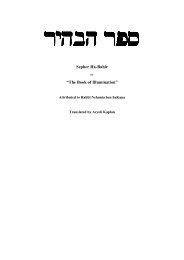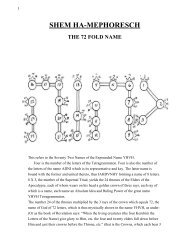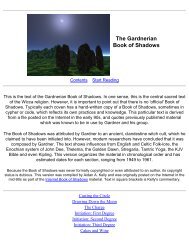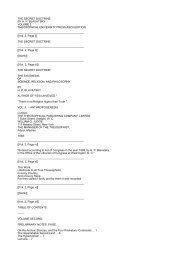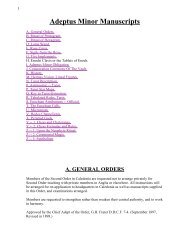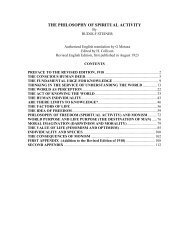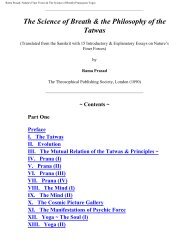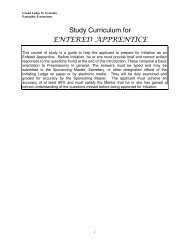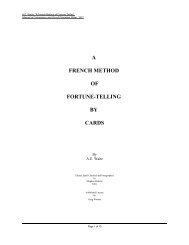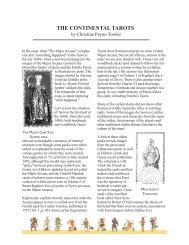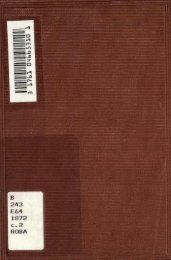You also want an ePaper? Increase the reach of your titles
YUMPU automatically turns print PDFs into web optimized ePapers that Google loves.
Plate II.<br />
l<strong>of</strong>ty white crown. As Prince <strong>of</strong> gods and <strong>of</strong> men (3) he hath received <strong>the</strong> crook and <strong>the</strong> flail and <strong>the</strong><br />
dignity <strong>of</strong> his divine fa<strong>the</strong>rs.[2] Let thy heart which is<br />
[1. The word ### er-pat is composed <strong>of</strong> er "chief" and pat a clan, "tribe," or "family"; Seb, <strong>the</strong>n, was <strong>the</strong> prince <strong>of</strong> <strong>the</strong><br />
family <strong>of</strong> <strong>the</strong> gods. Erpat is a very ancient word, and was probably in use in Egypt before suten, <strong>the</strong> common word for<br />
"king." For a discussion on this point see Maspero, Un Manuel de Hiérarchie Égyptienne, p. 15 ff.; Brugsch, Aegyptologie,<br />
p. 210.<br />
2 Osiris, <strong>the</strong> night sun, was <strong>the</strong> son <strong>of</strong> Ra, and <strong>the</strong> fa<strong>the</strong>r and son <strong>of</strong> Horus. He is always represented as a mummy holding<br />
in his hands <strong>the</strong> sceptre ### crook ### and flail ###. See Lanzone, Dizionario, p. 690 ff.; Wiedemann, Religion, p. 123 ff.;<br />
Brugsch, Religion und Mythologie, p. 611 ff.]<br />
{p. 254}<br />
in <strong>the</strong> mountain <strong>of</strong> Amenta be content, for thy son Horus is stablished upon thy throne. (4) Thou art<br />
crowned lord <strong>of</strong> Tattu[1] and ruler in Abtu.[2] Through <strong>the</strong>e <strong>the</strong> world waxeth green (5) in triumph<br />
before <strong>the</strong> might <strong>of</strong> Neb-er-tcher.[3] He leadeth in his train that which is and that which is not yet, in his<br />
name (6) Ta-her-seta-nef;[4] he toweth along <strong>the</strong> earth in triumph in his name Seker.[6] He is (7)<br />
exceeding mighty and most terrible in his name Osiris. He endureth for ever and for ever in his name<br />
Un-nefer.[6] (8) Homage to <strong>the</strong>e, King <strong>of</strong> kings, Lord <strong>of</strong> lords, Prince <strong>of</strong> princes, who from <strong>the</strong> womb <strong>of</strong><br />
Nut hast possessed <strong>the</strong> world (9) and hast ruled all lands and Akert.[7] Thy body is <strong>of</strong> gold, thy head is <strong>of</strong><br />
azure, and emerald light encircleth <strong>the</strong>e. O An[8] <strong>of</strong> millions <strong>of</strong> years, (10) all-pervading with thy body<br />
and<br />
[1. The name Tettet or Tattu was borne by two towns in Lower Egypt: Busiris, <strong>the</strong> metropolis <strong>of</strong> <strong>the</strong> 9th nome, and<br />
Mendes, <strong>the</strong> metropolis <strong>of</strong> <strong>the</strong> 16th nome. See Brugsch, Dict. Géog., p. 978, and De Rougé, Géographie Ancienne de la<br />
Basse Égypte, p. 58.<br />
2. Both Busiris and Abydos claimed to be <strong>the</strong> resting place <strong>of</strong> <strong>the</strong> body <strong>of</strong> Osiris.<br />
3. A name <strong>of</strong> Osiris when his scattered limbs had been brought toge<strong>the</strong>r and built up again into a body by Isis and<br />
Nephthys: see Lanzone, Dizionario, p. 714. The name means "lord <strong>of</strong> entirety."<br />
4. I.e., The one who draws <strong>the</strong> world.<br />
5. Seker is, like Ptah, Osiris, and Tenen, a form <strong>of</strong> <strong>the</strong> night sun. At <strong>the</strong> festival <strong>of</strong> this god, <strong>the</strong> Hennu boat, a symbol <strong>of</strong><br />
<strong>the</strong> god Seker <strong>of</strong> Memphis, was drawn round <strong>the</strong> sanctuary at dawn at <strong>the</strong> moment when <strong>the</strong> sun casts its golden rays upon<br />
<strong>the</strong> earth. For a list <strong>of</strong> Seker's shrines, see Lanzone, Dizionario, pp. 1117-1119. See also Wiedemann, Religion, p. 75;<br />
Pierret, Panthéon, p. 66.<br />
6. A name <strong>of</strong> Osiris which, as an important name, is written at times in a cartouche, e.g., ###, ###. It is usually explained<br />
to mean "<strong>the</strong> Good Being," although it has been suggested ### (Proc. Soc. Bibl. Arch., 1886) that "beautiful hare" is its<br />
signification.<br />
7. A general term for a necropolis. Akert is <strong>the</strong> country <strong>of</strong> which Osiris was <strong>the</strong> prince; and it is mentioned as connected<br />
with Stat and Neter-khert, each <strong>of</strong> which is a name <strong>of</strong> <strong>the</strong> great necropolis on <strong>the</strong> western bank <strong>of</strong> <strong>the</strong> Nile. See Brugsch,<br />
Dict. Géog., p. 75; Lepsius, Todtenbuch, chap. 165, 1. 6; Naville, La Litanie du Soleil, p. 98.<br />
8. An or Ani, a name or form <strong>of</strong> Ra, <strong>the</strong> Sun-god (compare "Ani at <strong>the</strong> head <strong>of</strong> <strong>the</strong> cycle <strong>of</strong> <strong>the</strong> gods," Grébaut, Hymne, p.<br />
22), and also <strong>of</strong> Osiris. Ani is also identified with <strong>the</strong> Moon-god; compare {footnote p. 255} [*] "Hail, Ani, thou shinest<br />
upon us from heaven every day. May we never cease to behold thy rays! Thoth protecteth <strong>the</strong>e and maketh thy soul to<br />
stand up in <strong>the</strong> maat boat in thy name <strong>of</strong> Moon." For <strong>the</strong> identification <strong>of</strong> Ani with Horus, see Naville, La Litanie du Soleil,<br />
p. 99, note 10. The god Ani is also addressed as "Eye <strong>of</strong> Horus " by <strong>the</strong> deceased in <strong>the</strong> 39th chapter <strong>of</strong> <strong>the</strong> <strong>Book</strong> <strong>of</strong> <strong>the</strong><br />
<strong>Dead</strong>, which refers to <strong>the</strong> "uniting <strong>of</strong> a soul to its body in <strong>the</strong> underworld."<br />
* For <strong>the</strong> hieratic text, see De Horrack, Lamentations d'Isis et de Nephthys, p. 4, II. 1-3.]<br />
http://www.sacred-texts.com/egy/ebod/ebod14.htm (2 <strong>of</strong> 3) [8/10/2001 11:24:50 AM]




